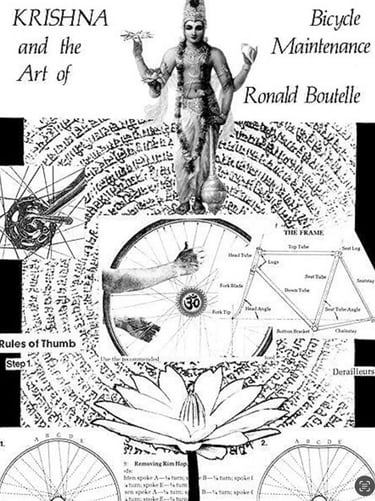Providing FREE vegetarian meals during times of natural disasters


Note: Richard Mende is a graduate of Stanford University and former religious editor for, “The Berkeley.” Richard is also the author of, “The Torch,” available on Amazon.
- Forward -
Richard Mende
Ronald Boutelle’s first book is such a delightfully deceptive work, it might easily be overlooked in the avalanche of efforts that pass for devotional literature. The book is deceptive because the author’s childlike world view, which occupies the early pages, gives only a hint of the middle and late chapters.
In the opening chapters, for example, are anecdotes of his early life of a kind, told in an artless manner usually reserved for intimate friends. Never intended for the literary sophisticate, these stories convey to the heart of the simple reader a sense of the author’s deep compassion, even from childhood. And there are numerous supernatural incidents, such as a box of cookies materializing when Ronald simply had the intense wish for them.
But the book quickly moves onto deeper matters. Since I’ve been a vegetarian for almost a quarter century, I approached the material on this subject with a ho-hum attitude. Yet, Mr. Boutelle’s own personal experiences are intertwined with such compelling arguments that I found myself on the edge of my chair, again emotionally wrought up on this subject. And it was not only his ability to feel the suffering of other creatures. Ronald marshaled an arsenal of quotations nicely presented from works as varied as the Essene Gospel, the Dhammapada, Shrimad-Bhagavatam, Manusmriti and the Old and New Testaments, to name a few. The author has a special gift for taking familiar material and making it seem as if we had now read it for the first time. But his extensive research has produced many items that would be new to most of us.
All of this is just groundwork. The book spins effortlessly, like a well-balanced wheel to its richest and deepest themes. With rugged truthfulness and innocent candor, Boutelle moves directly to the subject matter which is of core interest to the saints of both the Eastern and Western tradition. The preliminary attitude of compassion has been firmly established. Now one moves into the deepest and most concealed mysteries known to the saints, which, however, are at the same time available to anyone for the asking. These matters are discussed in both the Christian and Vaishnava (devotees of Lord Krishna) traditions.
Religions of the world, to beginners, at least, seem so varied in their customs, Scriptures, holidays, means of worship, etc. But if one advances to the far end of any of these religions, to where the consciousness of the saints reside, there is in all of them the common practice which Mr. Boutelle discusses so lucidly.
This common denominator, of course, is constant prayer. And the most urgent and powerful form of prayer is the calling upon of the Holy Name. The author has entered into the richest of all treasures. He cites the scholarship that indicates that the names Kristos, Christ, and Krishna have common root, and that powerful results are obtained from chanting either. With a formidable array of sources which again, seem more like the presentation of an inspired, saintly lad, than that of a dusty scholar, Boutelle presents quotes from the Philokalia, the New and Old Testaments, the lives of the Christian and Vaishnava saints, and the spiritual classics of the East.
I must say that this incredibly simple, homespun style somehow seems the most apt background—perhaps the most perfect way to present these great gems of devotional passages. Out of mountains of religious literature, the author has moved unerringly to the simple truths which the saints hold so dear: compassion, prayer and constant repetition of the names of God.
I would be willing to take a virtual vow before any reader that however steeped he may be in the literature of the Holy Name, this presentation will be at once inspiring, fresh and overpowering; inflaming a devotional mood and compelling a sense of urgency for constant practice of the Holy Name.
The literary sophisticates who may pass this book by will incur loss beyond measure. Ordinary theologians, what to speak of academic teachers of religion, are left far behind. Perhaps Providence had marked this book to be directed to a single soul, humble and unpretentious. Perhaps these priceless treasures are here for a very wide audience. But I firmly believe that long after the bones of this reviewer are diminished to dust—long after today’s churches and mandirs have also tumbled and decayed, this singular, plain-spun book will be around.
